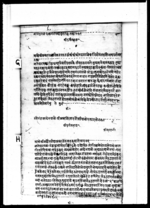A copy of an executive order from Cautariyā Amara Siṃha Śāha directing judicial officers of Patan to come to a decision regarding the rightful claimant to the crop yields from plots belonging to the Luthāma Guṭhī (VS 1860)
ID: E_2254_0001H
Edited and
translated by Manik Bajracharya
in collaboration with
Pabitra Bajracharya
Created: 2020-09-22;
Last modified: 2022-04-05
For the metadata of the document, click here
The accompanying edition, translation/synopsis and/or commentary are available under the terms of the Creative Commons Attribution-ShareAlike 4.0 International License
Abstract
This is a copy of an executive order of Cautariyā Ambar Siṃha Śāha directing judicial officers of Patan to reach judgement as to the rightful claimant the harvests of the Luthāma Guṭhī.Diplomatic edition
[1r]
1श्री:\1तसैभंदाअघिभयाको∙श्रीअमरसिंहसाहचौतरियाकोदस्खत्कोनकल¯¯¯ ¯¯¯ ¯¯¯ ¯¯¯ ¯¯¯ ¯¯¯ ¯¯¯ ¯¯¯९1श्रीदुर्गासहाय:\1श्रीमहारानी१1⟪8⟫1स्वस्तिश्रीमच्चौतरियाअमरसिंहसाहकस्यलिखापत्रम्¯¯¯ ¯¯¯ ¯¯¯ ¯¯¯ ¯¯¯2आगेपाटनका∙डिठ्ठाद्वार्याविचारीगैगैह्रके∙यथोचित∙जागीरकामोहोरपनिपछिकाता
3गीरगरिदियाका∙सहिहुंछन्∙न्यायकोमोहोर∙अघिभयाको∙अन्यायपर्याकोभया∙न्याय
4पारिदियाकोपछिको[?]सहिहुंछ∙अमालिकादशषतका∙अर्थकन∙दोहोरापनिहुंछन्∙
5क्याअर्थलाइभन्या∙पछिनिरूपणगर्द्दा∙ढाँटकोकंढोभाँचनर∙साँचाकन∙निरूपणगरि∙नि
6यानुगरिदिनुदाउलेदिंछन्∙तसर्थ∙जीवराजवाँडाकोसंतानभाजुधनजैसिमार∙रामानं
7दवाँडामाहाँ∙जोठहर्छउस्कन∙आलिवालिकोनियानुगरि∙भोग्यगराइदिन्यापोहोर∙कै
8ल्हैकसैलाइ∙कैल्हैकसैलाइ∙गर्द्दातिमिहरुलेथाम्न्याहो∙त्योनिरूपणगर्नु∙शक्छौँभन्या∙
9भलामनुष्यराषि∙निरूपणगरि∙दण्डपातिगरि∙छिनिदेउ∙हामिलेत∙निरूपणगर्नशक्यौन
10भन्या∙भनिपठाउ∙तिमिहरुशुद्दाराषि∙काठमाडौमानिरूपणगरि∙दिउँला¯ ¯१¯काजग्गा
11हमहाँ∙अन्यायपर्यावेहोर्नुतिमिहरुलाई∙पर्न्याछ∙निरूपणगरि∙मोहररुक्का∙सुप्याका
12धान∙रामानंदवाँडाकाहाँवाटवलात्कारगरिल्यायाकाउसैकाघरपुर्याइदिनुपर्छ∙भन्या
13कादिनमाहाँ∙जुन्सभामाभन्यो∙उसाभामानआईपुग्न्याझुट्टा∙इतिसंवत्१८६०मिति
14मागशु३रोज५शुभम्¯¯¯ ¯¯¯ ¯¯¯ ¯¯¯ ¯¯¯ ¯¯¯ ¯¯¯ ¯¯¯९
Translation
[1r]
[Below is] a copy of the document signed by venerable CautariyāAmara Siṃha Sāha issued earlier than that1 - 9
May glorious Durgā helps [us]
Venerable great queen - 1
82
Hail! A letter written by venerable Cautariyā Amara Siṃha Sāha
To the ḍiṭṭhās, dvāryās, vicārīs [and others] of Patan.
Yathocita3 : Even [in the case of] moharas relating to jāgīras, [other moharas] that override (tāgīra) them are valid. If [regarding] a mohara conveying a judicial decision there was a misjudgement earlier, a [reconsidered] judgement made at a later time is valid. An official document (daśkhata) issued by an amālī may have a double meaning. What is the reason [for this]? [He] issues it so that he can, during his later verdict (nirūpaṇa), punish the guilty and give justice to the truthful. For this reason, whoever between Bhājudhana Jaisī and Rāmānanda Bā̃ḍā is proven to be the [true] descendant of Jīvarāja Bā̃ḍā, [your duty is] to adjudicate in favour of him and let him enjoy the harvests [of the plots belonging to the Luthāma Guthi]. [Your duty is also to] check whether judgements have been made inconsistently. If you are able to reach a verdict, do so, and do it in the presence of notable persons. Inform me if you are unable to do so. I will deliver a verdict in Kathmandu in your presence. You will be responsible for a misjudgment made in the land of -1- (i.e., the venerable great queen). After delivering your verdict, you should return to the house of Rāmānanda Bā̃ḍa the unhusked rice which he had obtained earlier by authority of the mohara and rukkā and which was then forcibly taken away from him. The person who is absent in a court summoned on a stated should be considered guilty.
On Thursday, the 3rd of the bright fortnight of Mārga in the [Vikrama] era year 1860 (1803 CE). Auspiciousness.
Commentary
In the document of which is a copy, Cautariyā Amara Siṃha Sāha orders officials of Patan to determine who between Bhājudhana and Rāmānanda is the true descendant of Jīvarāja Bā̃ḍā, the founder of Luthāma Guṭhī. He directs them to come to judgement in consultation with local notables, with the winning party to be given the right to collect harvests from the guṭhī's plots. A note in the upper part of the document mentions that this document was issued prior to an earlier document in the series, a rukkā of Queen Rājarājeśvarī Devī (document E_2254_0001G).

